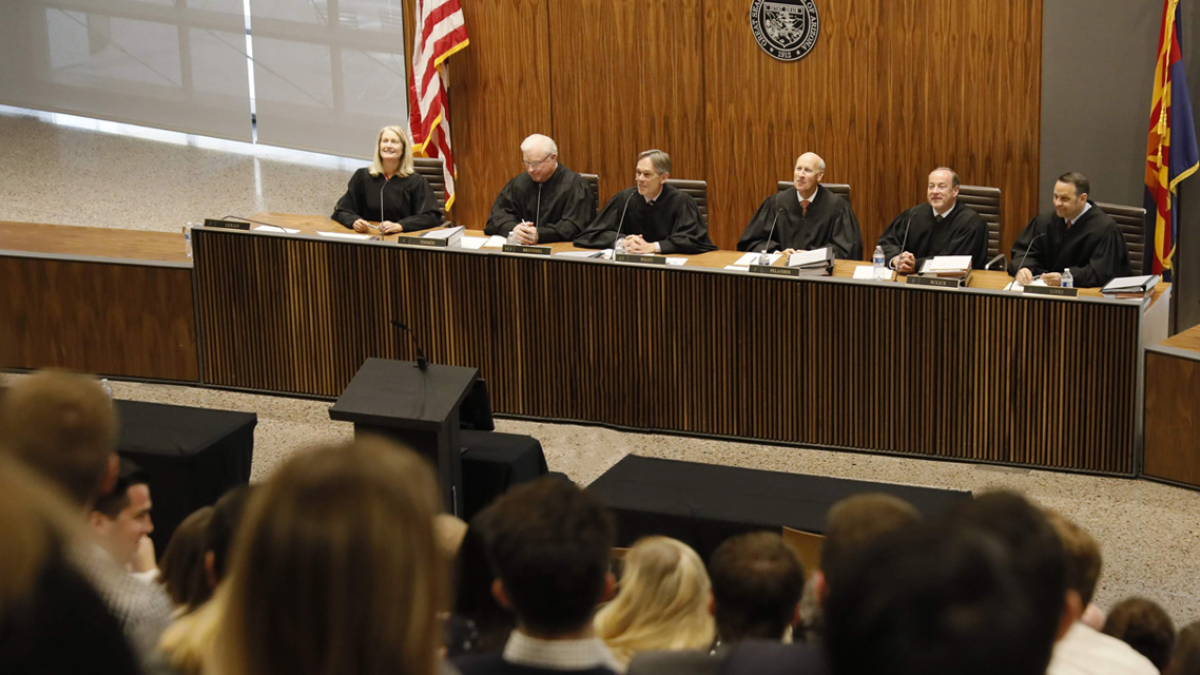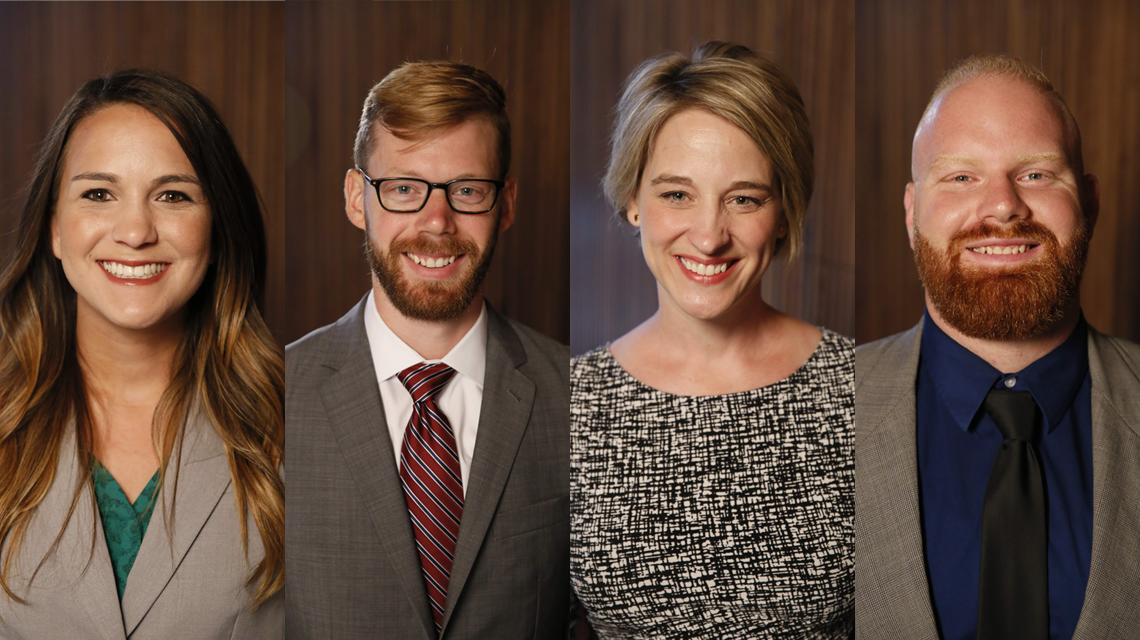ASU Law secures all-time high judicial clerkship placement for graduates

The Sandra Day O’Connor College of Law at Arizona State University has expanded its efforts to help students secure highly coveted positions, resulting in 34 students securing judicial clerkships in both 2018 and 2019 — all-time highs for ASU Law. And members of the 2020 class have secured 14 judicial clerkships at the federal level, the most ever for a single class.
A judicial clerkship can put law students on the path to a successful legal career, expanding both their skill sets and professional networks under the tutelage of the profession’s most experienced mentors.
Trevi Grant, ASU Law’s director of judicial clerkships, credits Assistant Dean Ray English, who oversees the law school’s Office of Career and Employment Services, with launching several initiatives to help more students secure judicial clerkships. That includes more direct outreach to students to help expose them to the idea of clerking and the opportunities available, and networking with judges to encourage them to consider ASU Law students for the positions.
Upon graduating from ASU Law this past spring, Heather Robles landed a clerkship with Arizona Supreme Court Justice Ann Timmer, where it will be a familiar work environment.
“I applied to the Judicial Internship Opportunity Program during my 1L year and was selected to intern for Justice Timmer,” Robles said. “I spent seven weeks in her chambers, working closely with her clerks. When the time came to apply for a clerkship, the Arizona Supreme Court was my first choice, and I am delighted to be clerking for Justice Timmer, whom I admire greatly.”
Robles, one of six spring 2020 semester ASU Law graduates clerking for the Arizona Supreme Court, said she received helpful assistance and advice on the application process from staff and faculty alike, including Career Services Director Veronica Chacon, Assistant Director Sarah Dunne, and Candice Boyd, director of student advising.
Creating more opportunities
ASU Law has utilized a multifaceted strategy to expand clerkship opportunities, filling the calendar with networking and informational events and ensuring students have the necessary support and resources throughout the application process.
That includes direct interaction with the judges themselves. Judicial receptions are held in the fall with federal judges, and in the spring with state judges, giving students the chance to interact and network with top jurists and lawyers from sponsoring law firms. And, separately, a panel discussion is held with federal and state judges, where students get advice on how to strengthen a clerkship application.
In addition, ASU Law works with the American Bar Association to foster clerkship opportunities. The school sends students to the ABA’s annual three-day Judicial Clerkship program, and participates in the ABA’s Judicial Internship Opportunity Program, which places students in summer internships with judges.
Sandra Day O’Connor College of Law graduates secure judicial clerkships in record numbers, including (from L-R) Stacy Skankey, Brian Teed, Heather Robles, and Brennan Bowen.
Another important resource are former clerks. ASU Law has implemented a clerk mentoring program, pairing alumni who have had clerkships with students interested in clerking. There is also a breakfast event, where former federal clerks meet with top 1L and 2L students to share their experiences and insights into navigating the application process. A judicial clerkship panel made of alumni discusses the benefits of clerking, what the jobs entail, and how experiences can differ depending on the specific court.
Brennan Bowen can attest to the value of speaking with alumni about clerkships. He is among the most recent ASU Law graduates clerking at the Arizona Supreme Court — co-clerking, in fact, with fellow graduate Jordan Buckwald for Justice John Lopez, JD ’98. Bowen said the thought of clerking had not crossed his mind when he entered law school.
“To be honest, when I came into law school, I had not even considered clerking,” he said. "I spoke with a friend of mine, Maddalena Savary, who is also an ASU Law grad, about the benefits of clerking. She was clerking at the time and really explained what a great opportunity it is. The more I learned about clerking, the more I became sure that it was the best way to launch my legal career.”
Bowen said ASU Law was his only choice when considering law schools and has been helpful throughout his time at the law school, specifically throughout the clerkship process by setting up mock interviews, providing contact information for alumni who had clerked with judges whom Bowen was applying to, and facilitating the application process for the Arizona courts. And Bowen is thrilled to have recently accepted a second clerkship with Judge Susan Brnovich of the U.S. District Court for the District of Arizona, which will follow his year with the Supreme Court.
“ASU Law has a great rank nationally, close proximity to the Phoenix legal market, and is the only law school in the heart of Phoenix — one of the nation's largest metropolitan areas,” he said. “So, naturally, ASU was the only choice.”
A law school at the heart of it all
Brian Teed grew up in Alabama, attended Birmingham Southern College, then got a master’s degree at Boston University. But his focus shifted to the West when he met and married his wife, who is originally from Prescott, Arizona. Among the final schools he considered for law school were ASU Law, the University of Arizona, California-Berkeley and the University of Alabama.
Like Bowen, he decided on attending ASU Law not only because it offered the best financial deal, but because it also offered the best proximity to courts.
His first summer, he externed at the Arizona Supreme Court staff attorney’s office. That was followed by nearby stints with U.S. District Judge Douglas Rayes, U.S. District Judge James Teilborg, the federal public defender’s office in Arizona, and the ASU Law Public Defender Clinic at the Maricopa County public defender’s office — in addition to spending his second law-school summer in Washington, D.C., working at the U.S. Department of Justice’s Professional Responsibility Advisory Office.
“So geographic proximity was a huge driver. I chose ASU Law based on whether I would graduate in debt, and based off my chances of getting a federal clerkship.”
Teed graduated in May and will begin a one-year clerkship with Judge David Weinzweig of the Arizona Court of Appeals in August. That will be followed by a return to the U.S. District Court for the District of Arizona, where Teed will reunite with Judge Rayes for a federal clerkship. Teed is looking forward to what he can learn from clerking at both the state and federal level, hoping it can help set him on the path to becoming a judge at the state appellate level, after perhaps practicing some criminal law or state appellate law.
“A clerkship is a fantastic way to start earning that experience by seeing what the day-to-day is like for a judge, and writing orders and opinions,” he said. “In particular, I'm excited that my clerkships give me the opportunity to look at appellate courts and trial courts at the state and at the federal level. It will give me good exposure to a wide range of legal issues.”
Arizona and beyond
ASU Law’s downtown Phoenix location provides an abundance of local clerkship possibilities. But as a top 25 law school, ASU Law continues to extend its reach nationally. The law school draws competitive applicants from all over the country, and, likewise, job opportunities are opening to ASU Law students and graduates far beyond Phoenix.
Stacy Skankey, like Teed, envisions a career in appellate work. And in her legal studies, she says she has been fascinated by state constitutions.
“Several state constitutions have clauses that parallel the United States Constitution,” she said. “And, arguably, advocates at the state level aren't using the clauses appropriately, they just rely on the United States Constitution interpretation. So I already knew I wanted a lot of experience in understanding a state constitution, how to use it and how to argue it in a different way than the U.S. Constitution.”
She says in speaking with mentors at ASU Law, she was advised that if that’s what she’s particularly interested in, she should widen her pool and look beyond Arizona, to increase her chances of getting a relevant clerkship. When she garnered interest from South Dakota’s Supreme Court, she was hesitant, because she’s established in Arizona — with a husband, two children and a third on the way — and clerks are usually expected to make a long-term commitment to their jurisdictions. But South Dakota was interested in quality applicants, above all else, and was impressed enough with Skankey to offer her a clerkship without a commitment to stay.
Her clerkship began last August, and involves working with all five of South Dakota’s Supreme Court justices. She says the eclectic nature of her specific clerkship has been an amazing experience, getting to learn a diverse set of styles and approaches.
“It's almost night and day in how much I've grown, in terms of real analysis of a legal issue and how to survey other areas and look at the law,” she said. “It’s a subtle change as you're going along through the process, but in the end it is a dramatic change of how much you're learning and growing in that year and how much both legal advice and life advice you're getting from these fantastic justices who are very kind and open and understand their role in all of this, which is to mentor you and get you out there and make you a good advocate.”
Top photo: The Sandra Day O’Connor College of Law hosts the Arizona Supreme Court Oral Arguments in 2019. ASU Law has expanded its efforts to help students secure highly-coveted judicial clerkships, resulting in record highs.
More Law, journalism and politics

How to watch an election
Every election night, adrenaline pumps through newsrooms across the country as journalists take the pulse of democracy. We gathered three veteran reporters — each of them faculty at the Walter…
Law experts, students gather to celebrate ASU Indian Legal Program
Although she's achieved much in Washington, D.C., Mikaela Bledsoe Downes’ education is bringing her closer to her intended destination — returning home to the Winnebago tribe in Nebraska with her…

ASU Law to honor Africa’s first elected female head of state with 2025 O’Connor Justice Prize
Nobel Peace Prize laureate Ellen Johnson Sirleaf, the first democratically elected female head of state in Africa, has been named the 10th recipient of the O’Connor Justice Prize.The award,…
